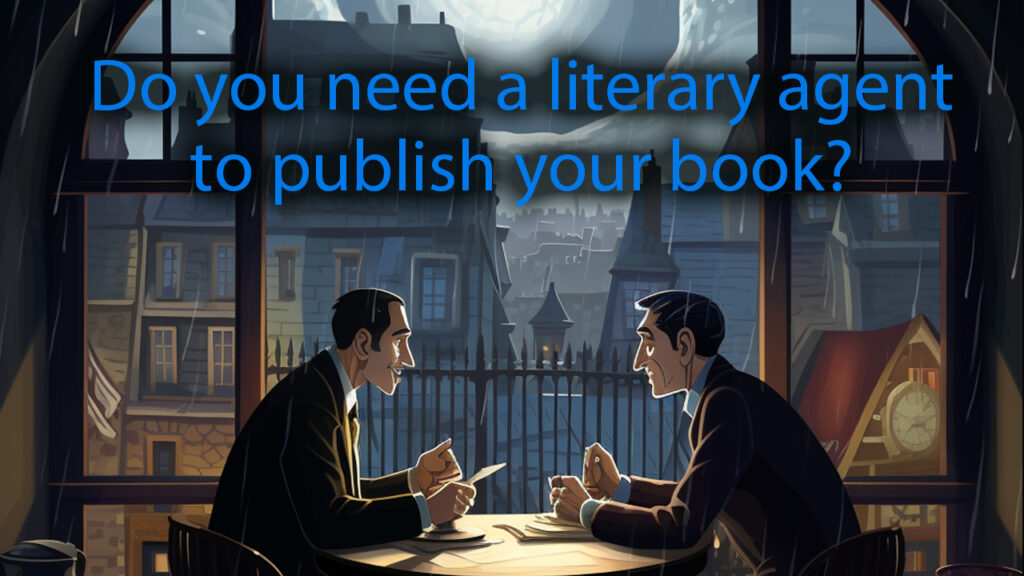
In the labyrinthine world of publishing, literary agents have long held a crucial key to the elusive realm of authorship. They’ve been hailed as gatekeepers, guiding aspiring authors through the intricate maze of manuscript submissions, negotiations, and publisher connections. For many, securing the representation of a literary agent was akin to a rite of passage into the publishing industry.
But as the publishing landscape shifts and morphs in response to the digital age, the question arises: Do you really need literary agents to get published? Is their role as essential today as it once was? In this exploration of the literary agent’s relevance in modern publishing, we’ll navigate the pros and cons of traditional representation and shed light on alternative paths to publication.
Join us on a journey through the changing face of the literary world, where aspiring authors now have more choices and possibilities than ever before. While literary agents have their place, the route to authorship is no longer a one-size-fits-all equation. As we unravel the complex web of literary agents and publishing, you might just discover that your path to publication doesn’t necessarily require their guidance. There are other avenues, and one of them might be closer than you think.
The Traditional Role of Literary Agents
For decades, literary agents have occupied a pivotal role in the traditional publishing ecosystem. Their responsibilities have been deeply intertwined with every aspiring author’s dream – to see their words bound within the covers of a book, nestled on the shelves of bookstores, and shared with readers around the world.
Navigating the Manuscript Submission Process: The journey often begins with the query letter, a carefully crafted pitch that authors send to literary agents. These agents, often with deep connections in the industry, can open doors that may remain firmly shut to unrepresented authors. They understand the nuances of query letters and know how to make manuscripts stand out in a crowded marketplace.
Negotiating Book Deals: Once an author secures the representation of a literary agent, they gain an advocate who not only helps negotiate publishing deals but also ensures the author receives favourable terms. Literary agents possess the skills to navigate the complex world of contracts, advances, royalties, and subsidiary rights, all with the author’s best interests at heart.
Access to the Right Publishers: Literary agents have a comprehensive knowledge of publishers and their preferences. They can match manuscripts with the publishing houses most likely to champion the work, increasing the chances of finding the perfect home for a book.
Leveraging Industry Connections: In an industry built on relationships, literary agents often have long-standing connections with publishers, editors, and other industry professionals. This network can be invaluable in securing a publishing deal and promoting an author’s work.
Guidance and Expertise: Beyond their industry connections, literary agents provide valuable guidance and expertise. They offer editorial feedback, helping authors refine their manuscripts to maximize their potential for success. This partnership can be instrumental in developing an author’s writing career.
While these advantages of having a literary agent are undeniable, it’s important to acknowledge that the traditional publishing model has its drawbacks. The process can be lengthy, competitive, and rejection-prone. Furthermore, literary agents typically take a percentage of an author’s earnings, which can impact overall revenue.
In the ever-evolving world of publishing, a new question arises: Are these traditional roles of literary agents still indispensable in the digital age? As we delve deeper into this inquiry, we’ll explore how the publishing landscape has evolved and whether aspiring authors now have alternatives that may be more suited to their individual goals.

The Shifting Landscape of Publishing
The publishing landscape, once governed by time-honoured traditions and gatekeepers, is undergoing a profound transformation, driven by the relentless march of technology and shifting consumer preferences. The emergence of the digital age has led to seismic changes that challenge the conventional wisdom surrounding literary agents.
The Digital Revolution: With the rise of digital platforms and e-books, authors now have the ability to publish their work independently. No longer constrained by the need for a physical publisher, many authors have seized the opportunity to self-publish. This shift in technology has allowed authors to reach readers directly, bypassing the traditional gatekeepers.
Self-Publishing Success Stories: The stories of self-published authors achieving remarkable success are becoming increasingly common. Independent authors, armed with talent, determination, and effective marketing strategies, have reached bestseller lists and attracted significant followings. For many of them, the need for a literary agent was bypassed entirely.
The Changing Dynamics: The dynamics between authors, literary agents, and publishers are evolving. Publishers are more open to considering submissions from authors without representation, and some have dedicated imprints for self-published works. As a result, authors have more options than ever before.
In this rapidly changing landscape, the role of literary agents faces new challenges and opportunities. The very definition of success is shifting, and aspiring authors must weigh the pros and cons of pursuing traditional representation in a world where independent publishing has become a powerful force.
Intrigued by these transformations in the publishing industry? Want to delve deeper into the changing dynamics and emerging trends? You might consider exploring our book, “State of the Book Publishing Industry: 2023.” It offers an in-depth look at how the industry has evolved and what it means for authors in today’s digital age. This valuable resource can provide insights and data to help you make informed decisions about your publishing journey.
As we continue to explore the pros and cons of literary agents and alternative paths to publication, keep in mind that the traditional model is no longer the only path to realizing your authorial dreams. The choice is yours to make, and it’s essential to make an informed decision that aligns with your unique goals and aspirations.

Pros and Cons of Literary Agents
The decision to work with a literary agent is a pivotal one for aspiring authors, and it’s essential to weigh the advantages and disadvantages carefully.
Pros of Literary Agents:
- Industry Expertise: Literary agents possess an in-depth understanding of the publishing industry. They are well-versed in market trends, what publishers are seeking, and how to position a manuscript for success. Their experience can be invaluable in helping authors navigate the competitive landscape.
- Access to Publishing Houses: Literary agents have established relationships with publishing houses and editors. This access can open doors that might otherwise remain closed to unrepresented authors. They can target the right publishers for a manuscript, increasing the likelihood of securing a book deal.
- Negotiation Skills: When it comes to negotiating book deals, literary agents are seasoned professionals. They are skilled at securing favourable contract terms, including advances, royalties, and subsidiary rights. Their expertise ensures that authors receive the best possible deal for their work.
- Guidance and Support: Beyond the business side of publishing, literary agents often provide editorial feedback and guidance. They help authors refine their manuscripts, enhancing the chances of creating a polished and marketable book.
- Validation and Credibility: Securing representation by a reputable literary agent can confer a sense of validation and credibility in the eyes of publishers and readers. It can be a mark of quality and professionalism.
Cons of Literary Agents:
- Competitive and Lengthy Submission Process: The traditional publishing model, with literary agents as intermediaries, can be highly competitive and time-consuming. The submission process often involves waiting for responses from agents and publishers, which can lead to frustration and delays.
- Commission Fees: Literary agents typically earn a percentage of an author’s earnings, usually around 15% of the royalties. While this fee can be considered an investment, it does impact an author’s overall revenue.
- Subjectivity in Selection: The preferences of literary agents can vary, and what one agent finds appealing, another may not. Rejection is a common experience for authors seeking representation, and it can be disheartening.
- Changing Industry Dynamics: The publishing industry is evolving rapidly, with increased opportunities for self-publishing and hybrid publishing models. Some authors may find that traditional representation doesn’t align with their goals or timelines.
In today’s ever-changing publishing landscape, aspiring authors have a broader range of options to consider. The decision to work with a literary agent is no longer the only path to publication. Authors must carefully weigh the pros and cons, keeping in mind their specific goals and preferences. As we delve further into the article, we’ll explore these alternative paths to publication and discuss how they might provide viable options for authors seeking to share their work with the world.

Alternative Paths to Publishing
As the publishing industry undergoes a significant transformation, alternative paths to publication have become increasingly viable for authors seeking to share their stories with the world. One such alternative is Celenic Earth Publications and its division, Celenic Book Publishers.
Celenic Earth Publications (CEP)
Established by author Shaun M Jooste in 2016, CEP represents a new era in publishing. CEP takes a distinct approach, breaking free from traditional, vanity, or self-publishing paradigms. Within the company, Celenic Book Publishers is the division dedicated to handling the publication of fiction books, setting out to provide authors with unique opportunities and services.
Celenic Book Publishers’ Services
We offer a range of services that differentiate it from traditional publishing and self-publishing models. With or without literary agents, these services encompass:
- Novels: We welcome authors interested in publishing novels, providing a platform for both new and established writers.
- Novelettes: For authors with shorter narratives, novelettes are an option that CEP accommodates.
- Short Story Anthologies: If you’re an author looking to showcase your short stories, we offer opportunities to participate in anthologies.
- Non-Fiction Books: While the foundation of Celenic Earth Publications is fiction, they have expanded to publish select non-fiction titles.
- Bibliographies: Bibliographies are another category where authors can explore their literary interests.
- Novel Adaptation: One unique feature is the opportunity to adapt games, films, TV series, or comics into novels. This adaptation is a distinctive service that authors, as well as property owners, can explore.
Benefits for Selected Authors
Being selected as an author for our program doesn’t need literary agents and comes with a range of advantages:
- Publishing Under Celenic Earth Publications: Authors selected for the submission have the opportunity to have their novels published under the reputable Celenic Earth Publications imprint, known for its commitment to quality, professionalism, and dedication to showcasing outstanding works of literature.
- Marketing and Promotions: We invest in comprehensive marketing campaigns and promotional activities to increase the visibility of books. They utilize various marketing channels, social media platforms, and an extensive network to generate awareness and drive sales.
- Generous Royalty Structure: Authors selected for this program benefit from a generous royalty structure, receiving a substantial 70% of the royalties generated from book sales.
- Free ISBNs: We provide free ISBNs (International Standard Book Numbers) for the books, allowing accurate tracking, distribution, and discovery by retailers, libraries, and readers worldwide.
- Retain Copyright and Publish Elsewhere: Authors retain the copyright to their work, granting them the freedom to publish their books elsewhere simultaneously, expanding their reach.
- Collaborations with the Entertainment Industry: We actively explore the potential for novels to be considered for adaptation into movies, series, or games in collaboration with the entertainment industry.
In conclusion, Celenic Earth Publications provides a unique alternative path to traditional publishing and self-publishing without needing literary agents, offering authors a range of services and opportunities. By selecting us as a publishing partner, authors can benefit from our expertise, marketing efforts, and industry connections, opening doors to a world of opportunities and possibilities for their narratives. If you’re interested in expanding your publishing horizons and reaching a broader audience, this alternative path is worth exploring.

Literary Agents or No Literary Agents: The Choice is Yours
At Celenic Earth Publications, we firmly believe in the power of choice. The landscape of publishing has evolved, offering writers more options and opportunities than ever before. In this evolving terrain, the question of whether literary agents are a necessity lingers. The answer? It depends on your unique journey as an author.
The Traditional Path: For many years, literary agents have served as gatekeepers, ushering authors through the traditional path to publishing. Their expertise, industry connections, and guidance have been invaluable to many writers. If you’re pursuing the traditional publishing route, engaging with a literary agent may still be a logical step.
However, it’s crucial to remember that the landscape has shifted. While literary agents play a vital role in this industry, they are no longer the sole bridge to publication. The rise of self-publishing and alternative publishing avenues has opened new doors, enabling authors to chart their course in different ways.
The Power of Choice: You, as a writer, are in control of your publishing destiny. Whether you choose the traditional route with a literary agent or embark on an alternative journey, the power to decide lies with you. What works best for one writer may not necessarily be the ideal path for another.
No Literary Agents Required for Us: At Celenic Earth Publications, we believe that authors have the right to pursue their publishing dreams without the need for an intermediary. You don’t need a literary agent to submit your work to us. We welcome submissions directly from authors, and our selection process is open to everyone.
Our mission is to offer a unique publishing experience that celebrates your creative vision. We understand that the choice of representation or the decision to go it alone is a personal one. It’s about finding the path that aligns with your aspirations, timelines, and goals.
Empowering Authors: We’re committed to empowering authors to make informed choices about their publishing journey. Whether you’re a seasoned writer or an aspiring author, the power to choose how you navigate the literary world rests in your hands. We’re here to support your decision and provide an alternative path that welcomes your creativity and unique storytelling, even if you don’t engage with literary agents.
If you’ve been considering whether you need literary agents to fulfill your publishing dreams, remember that you have a wealth of choices at your disposal. We’re ready to stand alongside you on your journey, providing a direct route to realizing your aspirations.
Your choice is pivotal, and it’s a decision we respect and embrace. Whether you decide to work with a literary agent or venture forth independently, remember that your storytelling journey is uniquely yours. Embrace the freedom to choose your path, and know that at Celenic Earth Publications, we’re here to champion your vision and help bring your words to life.
Your story, your choice, your publishing journey. It’s time to make the decision that aligns with your authorial dreams and aspirations. The choice is yours, and we’re here to support it.

Conclusion: Embracing Your Path to Authorship
In the ever-evolving world of publishing, the question of whether literary agents are a necessity is one that echoes through the creative minds of aspiring authors. The answer lies not in a one-size-fits-all solution but in the power of choice.
As we’ve journeyed through the traditional roles of literary agents, the shifting landscape of publishing, and the pros and cons of representation, one thing has become abundantly clear: the publishing world has diversified, and so have the opportunities for writers.
Whether you choose to embark on the traditional path with a literary agent guiding your way or dare to take the reins of your journey independently, the choice is yours. At Celenic Earth Publications, we honour that choice and offer an alternative path that welcomes authors from all walks of life.
We believe that writers don’t need to rely solely on literary agents to submit their works. We’re here to provide a platform that champions your creativity, offers unique opportunities, and supports your publishing aspirations. Your storytelling journey is uniquely yours, and we’re committed to helping you bring your words to life.
So, as you stand at the crossroads of your authorial dreams, remember that the power to choose is yours. Whether it’s the traditional route, self-publishing, or a collaboration with Celenic Earth Publications, your story deserves to be shared with the world.
Embrace your path to authorship. Make the choice that resonates with your heart and vision. Your journey is waiting, and we’re here to accompany you every step of the way.
Thank you for joining us in this exploration of the role of literary agents in the world of publishing. Your story is a unique tapestry, and the narrative is yours to weave. Embrace the freedom to choose, and may your words find their place in the hearts and minds of readers around the world.


